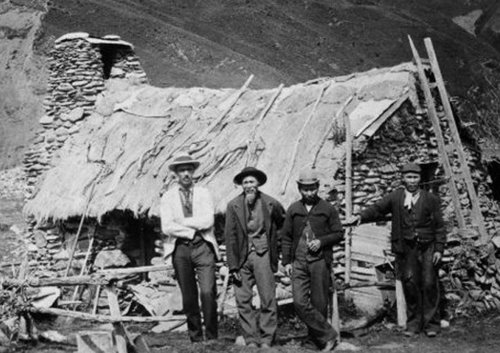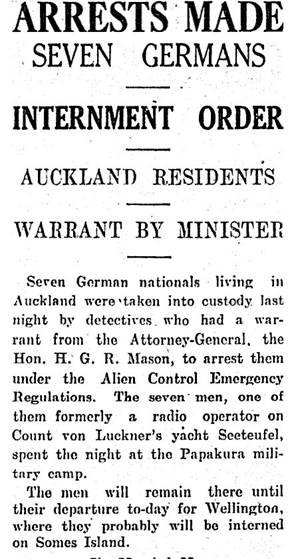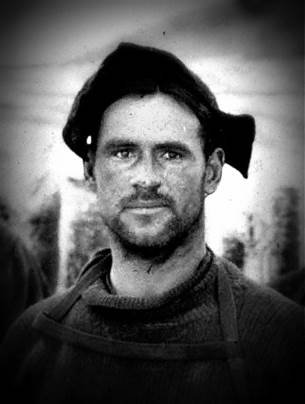
As it was an event which had to be marked on-air by broadcasters every year, recordings about Christmas were often stashed away in the archives, to be brought out annually and edited into holiday radio programming.
In oral history-style interviews, elderly people often reflect on past Christmases they celebrated in unusual locations – or under difficult circumstances. You can listen to a selection of these in my weekly radio programme with RNZ's Jesse Mulligan, or read about the recordings and listen to them at the links below.
Hero image: Chinese gold miners outside a stone dwelling in Macetown, circa 1900. (Alexander Turnbull Library, Wellington - Ref: 1/2-019150-F)
Christmas with Chinese Gold Miners
Our best-known treasure trove of oral history is the series of recordings made by the New Zealand Broadcasting Service Mobile Unit, which interviewed elderly people all over New Zealand between 1946 and 1948.
In Central Otago these included many who had been born during the gold mining era of the 1860s-1880s. In Arrowtown in 1948 they recorded Mrs Catherine Dudley, the daughter of a gold miner who had grown up in the boomtowns of Cardrona and Macetown.
She had many memories of living alongside the Chinese miners who had flocked to the area, recalling how they supported her when her husband was ill and how in return, she nursed several elderly members of the Chinese community during their final days.
In this excerpt, she remembers happier times, when the European and Chinese miners would get together to share a few drinks and a meal at Christmas in Macetown.
An interview with Mrs Catherine Dudley, who describes her father's experiences and her own memories of Arrowtown (04 Nov 1948 - 5737)
Christmas in an Internment Camp
A member of another group of migrant New Zealanders recorded memories of a less happy Christmas, spent during World War II as an interned ‘enemy alien’ on Matiu Somes Island in Wellington Harbour.
This internment camp held several hundred German, Italian and Japanese New Zealanders in both World Wars. This recording is by an unnamed German man, remembering the events of Christmases in 1939-1941. (If you think you can identify him, do let us know!) He arrived on the island on Christmas Eve, and though it was a sad occasion, the Commandant tried to cheer new guests.
Internees were invited to join in Christmas celebrations with the camp guards – a ‘magnanimous gesture of good will’ that laid the foundation for relations between the two groups. The speaker also recalls the beauty of choir singing that occurred at Christmas 1941.
'Christmas on Sommes Island' (320608)

Germans arrested and sent to Somes Island. (New Zealand Herald - 23 Dec 1939, Courtesy Papers Past)
Christmas on the Ice
Another recording about celebrating Christmas under difficult circumstances, comes to us from the BBC in 1941. It is by former Royal Navy officer Edward ‘Teddy’ Evans, who in 1910 was captain of the ship ‘Terra Nova’ that sailed from Lyttleton Harbour with Robert Falcon Scott’s Antarctic expedition which was trying to be first to reach the South Pole.
They spent months in the Antarctic setting up supply depots, and then in late 1911, Teddy Evans was a member of Scott’s party which set out to reach the Pole overland by sled. Around 150 miles from the Pole, Evans had to be sent back to base, as he became ill with scurvy through a lack of vitamin C. He was quite seriously ill, but eventually recovered - and ironically the illness saved his life, as the rest of Scott’s Polar party perished on the return journey from the Pole in January 1912.
Other survivors of the Terra Nova expedition recalled that seal meat – particularly seal liver, was one of the main sources of vitamin C in their diet – but Teddy was not a fan and tried to avoid eating it – which may account for his illness.

Edward Teddy Evans (1881–1957) - second in command on the Terra Nova Expedition, April 1911 (Photograph by Herbert Ponting, Pennell Collection, Canterbury Museum, via Wikimedia Commons)
In this short recording made during World War II, Teddy Evans recalls the final Christmas dinner he celebrated in 1911 with the legendary Captain Scott, before he had to turn back due to his illness. The ‘pemmican’ he mentions was a mixture of ground meat and fat, which was mixed with dry biscuits to form a stew. (You can read more about the role diet played in the fate of Scott’s expedition here. )
Edward ‘Teddy’ Evans - from Voices from the Past. (Episode 8 - Discoverers and Explorers)